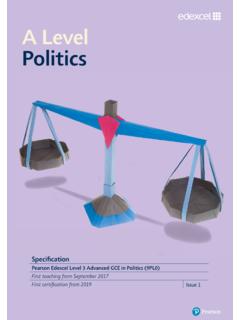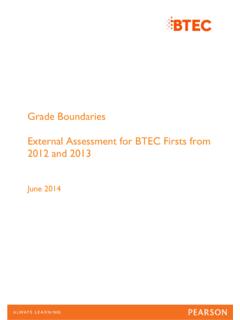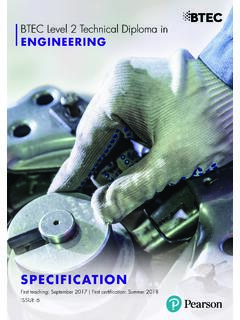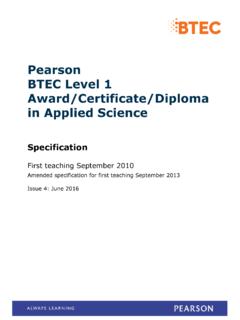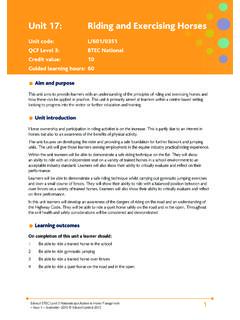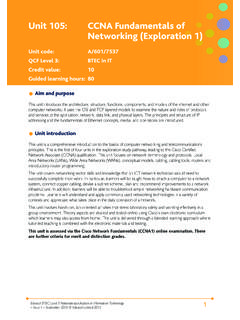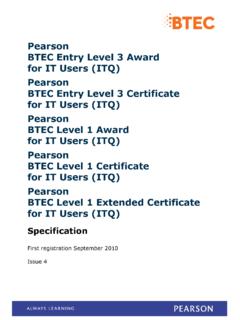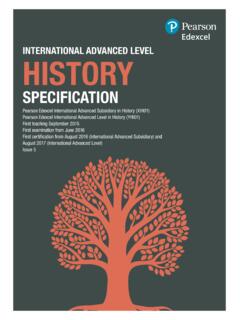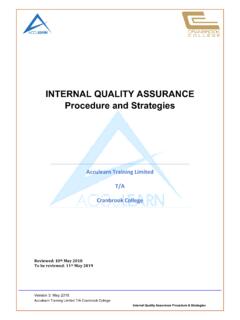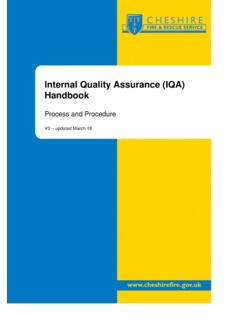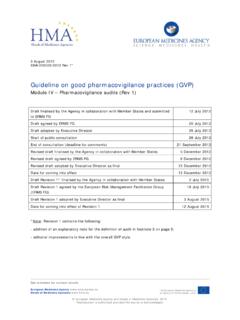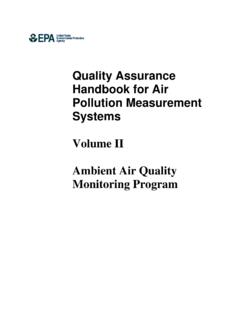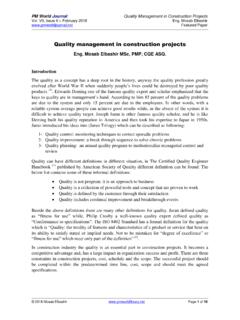Transcription of Quality Assurance Handbook
1 Quality Assurance Handbook Year 2021-22. Functional Skills English Levels 1 and 2. Speaking, Listening and Communicating Contents Contents .. 2. Using this Handbook .. 4. Additional Resources .. 4. Preparing to deliver Functional Skills Speaking, Listening and Communicating .. 5. Introduction to Functional Skills English Levels 1 and 2 .. 6. Speaking and Listening Assessment Tasks .. 6. How many learners should make up a group? .. 7. How should learners prepare for the assessment? .. 7. Special educational needs and requirements .. 7. Assessment of Speaking, Listening and Communicating .. 8. Invigilation .. 8. Your Quality Assurance responsibilities .. 9. internal Quality Assurance process .. 9.
2 Online Standardisation for Centre Assessors (OSCA) .. 9. Assessment and Verification Timeline .. 11. Standards verification .. 13. The standards verification process .. 13. Your Standards Verifier .. 13. internal Quality Assurance .. 14. Sampling .. 14. Advice for recording assessments .. 15. After your visit .. 15. Claiming certificates .. 16. Pearson Edexcel Centres .. 17. Centre administration responsibilities .. 17. Role of Assessor .. 17. internal verification .. 17. QA Handbook FS English L1&2 First Teaching Sept 2021 /Version 1 July 2021/DCL1. Page 2 of 21. The Lead internal Verifier role .. 18. Developing and supporting Assessors .. 19. internal Verification good practice 19. Submission of marks for FS English Levels 1 & 2 Speaking, Listening &.
3 Communicating .. 20. Registrations .. 20. Support .. 21. QA Handbook FS English L1&2 First Teaching Sept 2021 /Version 1 July 2021/DCL1. Page 3 of 21. Using this Handbook This resource is designed to help you with your Functional Skills English Level 1 and 2 Speaking, Listening and Communicating delivery. We advise that all Examinations Officers, Programme Managers, Lead internal Verifiers, internal Verifiers and Assessors in centres offering Functional Skills English at Levels 1 and 2 familiarise themselves with the contents of this Handbook . Additional Resources You will find additional resources, including bitesize guides to Speaking and Listening assessment, on our website. Centres must conduct all Functional Skills Level 1 and 2 examinations in line with the information in the Instructions for Conducting Examinations (ICE) document.
4 Your Examinations Officer should also access the UK Information Manual and the Instructions for Conducting Examinations. These documents are available on our website and contain information about entries and certification. QA Handbook FS English L1&2 First Teaching Sept 2021 /Version 1 July 2021/DCL1. Page 4 of 21. Preparing to deliver Functional Skills Speaking, Listening and Communicating Step Activity 1 Download specification/s, Quality Assurance Handbook , and ICE document. Please ensure that you familiarise yourself with these each year, as changes take place annually. 2 Set up your team as per the roles and responsibilities within the QA Handbook . 3 Ensure your Functional Skills team has appropriate access to Edexcel Online: Tutors, Assessors, internal Verifiers (IVs) and Administrators 4 Ensure your Lead internal Verifier (LIV) registers/renews their accreditation via Online Support for Centre Assessors (OSCA).
5 Accreditation runs from September to August every year. Completion of the OSCA process gives a centre Direct Claim Status for Level 1/2. You will only be able to claim certificates for English L1/2 if this has been completed. 5 Use exemplar videos from OSCA to standardise your team of Assessors and internal Verifiers before assessments begin. 6 Register your learners. 7 Work with Assessors to create task outlines for the Speaking, Listening & Communication component of English. These can be contextualised for individual learners or groups of learners. 8 You will be contacted by your Pearson Standards Verifier (SV) by January, provided you have registered learners. 9 Carry out assessments with learners.
6 Produce the required sample of video recordings for Standards Verification purposes. Internally verify assessment outcomes. 10 Prepare for your Standards Verification visit. Your Pearson Standards Verification visit will be carried out remotely. Following your Standards Verification visit, work on any actions or recommendations within the report provided by your SV. 11 Certificates will be issued automatically once your Lead internal Verifier has completed OSCA. (step 5). We will print certificates once all three units are completed (you will need to claim Speaking & Listening component on Edexcel Online.). QA Handbook FS English L1&2 First Teaching Sept 2021 /Version 1 July 2021/DCL1. Page 5 of 21.
7 Introduction to Functional Skills English Levels 1 and 2. The Functional Skills English qualification consists of three components: o Speaking, Listening & Communicating o Reading o Writing Learners must complete all units to gain their Functional Skills English Level 1 and 2 certificate. Speaking and Listening Assessment Tasks Learners must complete all activities to pass the Speaking, Listening & Communicating unit. The assessment time at each level should total approximately 25-30 minutes, depending on group size. At both levels the assessment can be completed across more than one session. There is no limit to the number of times a learner can retake their Speaking, Listening & Communicating assessment.
8 Level 1 tasks Level 2 tasks Talk (3-4 minutes) and Q&A Presentation (4-5 minutes) and Q&A. Group discussion (10 minutes) Formal discussion (15 minutes). Level 1 and Level 2 learners may be assessed together for the talk and presentation tasks. However, it is not recommended that Level 1 and Level 2 learners are assessed together for the discussion tasks due to the differing requirements of Level 1 and Level 2 discussions. If centres decide to assess Level 1 and Level 2 learners together for the discussion then they must ensure that no learners are disadvantaged and that all participants are able to meet the standards. This will be checked as part of a standards verification visit. If you have any queries about assessing Level 1 and 2 learners together, please get in touch with the Assessment team using the Support Porta QA Handbook FS English L1&2 First Teaching Sept 2020 /Version 5 Sept 2020/DCL1.
9 Page 6 of 21. How many learners should make up a group? A maximum of five participants must make up the discussion group, although not all those involved need to be assessed. The minimum number of participants required for the Level 1 and Level 2 discussion activities is three. A maximum of four participants must make up the group for talks (Level 1) and presentations (Level 2), although not all those involved need to be assessed. The minimum number of participants required for the talk/presentation and Q&A. is three. Members of teaching or support staff should not be used to make up the discussion group numbers. If there are less than three learners who require assessment, then it is acceptable for a learner or colleague who is not being assessed to take part in the discussion.
10 If you must use a colleague to make up the numbers please ensure that they are not involved in the assessment of Speaking, Listening and Communicating. How should learners prepare for the assessment? Learners may prepare notes on the set Speaking, Listening and Communicating activity to be used during the designated formal assessment. These notes can include bullet and numbered points. Notes must not include prepared responses ( continuous phrases and paragraphs). Group work and individual study can be used to complete this preparation. There is no set date or assessment window for Speaking, Listening & Communicating. Learners should be assessed when the Assessor believes they are ready and able to attain the criteria of the assessment.
